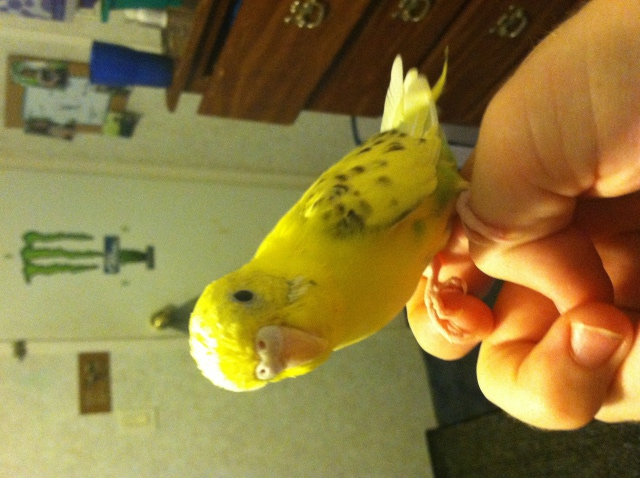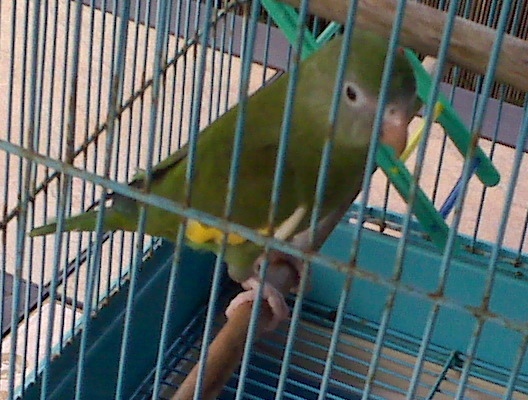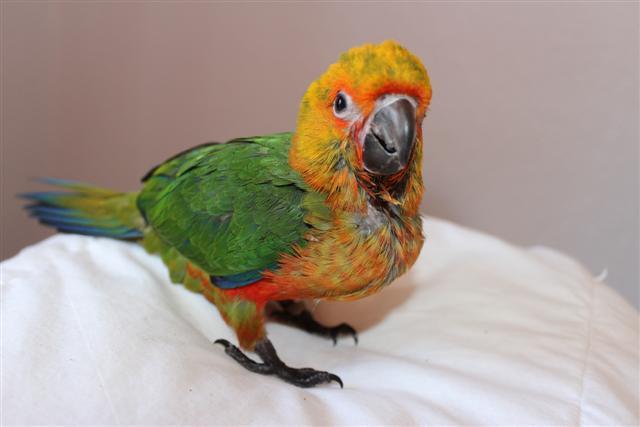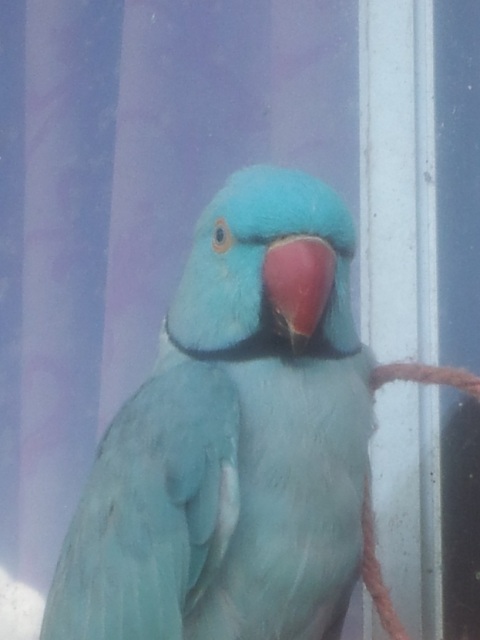Question-------------------------
Followup To
Question - Thank you so much for your advice... he will have a good life here even if it may be short due to poor health conditions for so long... hopefully it will be for a quite awhile because he deserves it... Should I mix the pellet with his seed and decrease the seed gradually that seems to be the preferred method and was just looking for a second opinion as he can be very stubborn, he is approx 10 years old... also are there any fruit or vegetables that would be better for him than others.. I am aware of the "dont's"... but this is the first bird I will be nursing back to health... Thanks again so much for your advice.... Lisa :)
He has been to an avian vet and I was looking for advice on bringing up his weight... we are switching him to high performance pellets but was concerned about him losing more weight in this transition... my avian vet was more into getting him on the diet he sells as opposed to giving me a sensible diet to help his weight... I need to get him up about 300-400 grams otherwise he seems pretty healthy.. he is a large wonderful greenwing... Thanks for any suggestions.. Lisa :)
Answer -
Hi Lisa,
First off- Thank you for rescuing this bird and making sure this macaw gets seen by a vet! It is so sad how many birds are improperly cared for and abused.
Your vet is probably not as much concerned with selling his food, as he is getting this obviously undernutished rescued bird on a good diet. Although seeds are fattening, they don't offer the nutients that this macaw needs. For example, it's similar to saying: I'll give McDonalds to this underweight child to fatten him/her up, because a diet of fruits, veggies, beans and rice, etc... won't help get his weight up.
So it is important for the macaw to get onto a pelleted diet like your vet suggested. Is it Harrison's that he sold you? This is by far one (if not the) best pelleted food on the market and should help imporove your macaw's health. If you want, suppliment your bird's pelleted diet with some nuts. Macaws eat lots of nuts in the wild and since nuts usually have lots of fat, this might be a good solution to your problem. You will still get him to eat pellets, veggies, etc..., while helping to increase the amount of fat in his diet by adding nuts.
Some nuts that are good are: Walnuts, Almonds, Brazil, and Palm nuts. But avoid peanuts, since they are not nearly as nutrious as other types.
You can also prepare baby bird formula (there are macaw-specific baby bird formulas which have more fat in them), and mix it with whole grain bread, veggies, etc... Or just serve it plain! :) Serve it in a dish, not from a spoon or syringe (like you would if the bird was still a baby).
During his transition to his new, pelleted diet... keep track of his weight and take it slowly. This will help him maintain his weight. Most of the birds that I've converted to pelleted diets don't loose much (if any) weight at all. The only bird's I've ever had loose weight during a diet conversion are very, very stubborn birds who I've had to really encourage to eat the pellets by limiting the amount of seed they are offered each day.
I hope this helps.
Let me know if you have any other questions, otherwise I would recommend speaking with your vet (or getting the opinion of a second vet if you are unsure of your vet's motives).
-Mag
AnswerHi Lisa,
Yes... it is terrific that you were able to rescue this bird and provide him with a better life. :) Hopefully he will have many, many years ahead of him thanks to you.
Usually mixing the pellets and seeds and then slowly weaning the bird off of the seeds is the prefered method, but that doesn't always work. Check out these websites for further information on conversion:
http://www.epah.net/birds/convert.html
http://www.companionparrot.com/articles/betterdiet.html
Here are also some tips for veggies/fruits that have that "lil' something extra":
fresh hot peppers, bell peppers, grapes, mango, papaya, apple, pears, corn, peas, carrots, cucumber, zucchini, and other squashes, fresh bananas, (not chips), peaches, nectarines, plums, cherries, and other berries. Potatoes, tomato, jicama, dark leafy greens, broccoli, etc. can also be offered.
Basically, the darker the veggie, the better. Vegetables are also much, much better than fruits, since fruits often have high water and high (natural) sugar content. Stay away from most lettuce (except maybe romaine).
I hope this helps.
-Maggie

 Parakeet gender
Question
Parakeet
Hi, I looked for an expert und
Parakeet gender
Question
Parakeet
Hi, I looked for an expert und
 What type of parrot is this?
Question
Friendly bird
A week ago ths small parrot flew
What type of parrot is this?
Question
Friendly bird
A week ago ths small parrot flew
 ID Birds
Question
Panama Birds
My uncle served in Panama in 1941
ID Birds
Question
Panama Birds
My uncle served in Panama in 1941
 Jenday Conure Weaning?
Question
Castor the Conure
Hi
I have a 9 week o
Jenday Conure Weaning?
Question
Castor the Conure
Hi
I have a 9 week o
 RE: Indian Ringneck probems
Question
Indy our Ringneck
Thank you for your he
RE: Indian Ringneck probems
Question
Indy our Ringneck
Thank you for your he